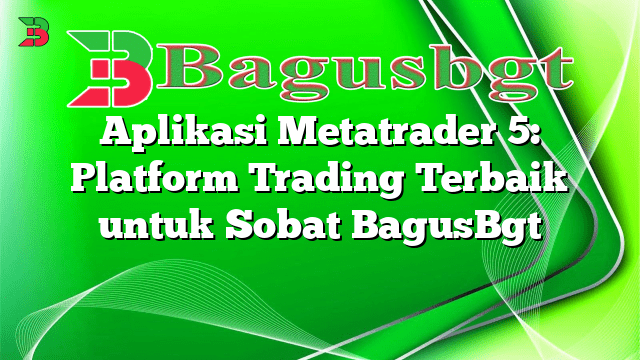Hello readers, welcome to our article on alternatives to forex trading. In this piece, we will explore various investment options that can serve as alternatives to forex trading. While forex trading is a popular investment choice, it is not the only option available. By diversifying your investment portfolio, you can minimize risks and maximize potential returns. Let’s delve into these alternatives and explore their advantages and disadvantages.
1. Stock Market
The stock market is a well-established investment avenue that offers a wide range of opportunities. By investing in stocks, you become a partial owner of the company and have the potential to earn dividends and capital gains. The stock market is highly liquid and provides investors with the opportunity to invest in different sectors and industries. However, it is important to note that stock prices can be volatile, and thorough research and analysis are required to make informed investment decisions.
2. Bonds
Bonds are considered a relatively safer investment option compared to forex trading and stocks. When you invest in bonds, you are essentially lending money to a government or corporation in exchange for regular interest payments. Bonds provide a fixed income stream and are less affected by market fluctuations. However, the returns on bonds are generally lower compared to stocks, and there is a risk of default by the issuer.
3. Commodities
Investing in commodities such as gold, silver, oil, or agricultural products can be an alternative to forex trading. Commodities are physical assets that can serve as a hedge against inflation or economic uncertainties. However, commodity prices can be influenced by factors such as supply and demand dynamics, geopolitical events, and economic indicators. It is crucial to stay updated with market trends and factors affecting the specific commodity you wish to invest in.
4. Real Estate
Real estate investment involves purchasing properties, such as residential homes, commercial buildings, or land, with the expectation of earning income through rental yields or capital appreciation. Real estate is a tangible asset that can provide stable returns over the long term. However, investing in real estate requires substantial capital, and the market can be affected by factors such as location, economic conditions, and government policies.
5. Mutual Funds
Mutual funds pool money from multiple investors to invest in a diversified portfolio of stocks, bonds, or other assets. They are managed by professional fund managers, reducing the need for individual research and analysis. Mutual funds offer diversification and are suitable for investors who prefer a hands-off approach. However, fees and expenses associated with mutual funds can impact overall returns.
6. Exchange-Traded Funds (ETFs)
Similar to mutual funds, ETFs offer investors exposure to a diversified portfolio of assets. The main difference is that ETFs are traded on stock exchanges, providing liquidity and the ability to buy and sell throughout the trading day. ETFs can track specific indexes or sectors, allowing investors to gain exposure to a particular market segment. However, ETFs also have associated fees, and their prices can be influenced by market volatility.
7. Cryptocurrencies
Cryptocurrencies, such as Bitcoin and Ethereum, have gained significant popularity in recent years. These digital currencies operate on blockchain technology and offer decentralized and secure transactions. Cryptocurrencies can be highly volatile, presenting both opportunities and risks. It is essential to understand the technology, market trends, and potential regulatory changes before investing in cryptocurrencies.
8. Peer-to-Peer Lending
Peer-to-peer lending platforms connect borrowers directly with lenders, eliminating the need for traditional financial intermediaries. As a lender, you can earn interest by lending money to individuals or small businesses. Peer-to-peer lending provides an alternative investment avenue with potentially higher returns compared to traditional savings accounts. However, it is important to assess the creditworthiness of borrowers and diversify your lending portfolio to mitigate default risks.
9. Options Trading
Options trading involves buying and selling options contracts, which give the holder the right to buy or sell an asset at a predetermined price within a specified period. Options trading can be used to generate income or hedge existing positions. However, it is a complex investment strategy that requires in-depth knowledge and understanding of options pricing, volatility, and market movements.
10. Precious Metals
Investing in precious metals, such as gold, silver, or platinum, can serve as a hedge against inflation and currency fluctuations. Precious metals have intrinsic value and are considered a safe haven during times of economic uncertainty. However, the prices of precious metals can be influenced by various factors, including global demand, geopolitical events, and mining production.
Investment Option |
Advantages |
Disadvantages |
|---|---|---|
Stock Market |
Opportunity for capital gains, diversification, potential dividends |
Market volatility, potential losses |
Bonds |
Stable income stream, relatively lower risk |
Lower returns compared to stocks, risk of default |
Commodities |
Hedge against inflation, potential for profit during market uncertainties |
Price volatility, affected by external factors |
Real Estate |
Stable income, potential for long-term appreciation |
High capital requirement, market fluctuations |
Mutual Funds |
Professional management, diversification |
Fees and expenses, potential underperformance |
Conclusion
In conclusion, forex trading is not the only investment option available to investors. By exploring alternatives such as the stock market, bonds, commodities, real estate, mutual funds, ETFs, cryptocurrencies, peer-to-peer lending, options trading, and precious metals, you can diversify your portfolio and potentially enhance your investment returns. Each alternative has its own advantages and disadvantages, and it is crucial to conduct thorough research and analysis before making any investment decisions. Remember to align your investment choices with your risk tolerance, financial goals, and investment horizon. Happy investing!
Frequently Asked Questions (FAQs)
Q: Is forex trading riskier than the alternatives mentioned?
A: Forex trading can be highly volatile and risky, as it involves currency fluctuations and leveraged trading. However, other investment alternatives also carry risks, and the level of risk varies depending on the investment option and market conditions.
Q: Can I invest in multiple alternatives simultaneously?
A: Yes, diversifying your investment portfolio by investing in multiple alternatives can help mitigate risks and maximize potential returns. It is advisable to consult with a financial advisor to determine the optimal allocation based on your financial goals and risk tolerance.
Q: Are the returns on alternative investments guaranteed?
A: No investment can guarantee returns, and the performance of alternative investments can be influenced by various factors. It is important to understand the risks involved and make informed investment decisions based on thorough research and analysis.
 Bagus Banget Kumpulan Informasi terbaru dari berbagai sumber yang terpercaya
Bagus Banget Kumpulan Informasi terbaru dari berbagai sumber yang terpercaya




